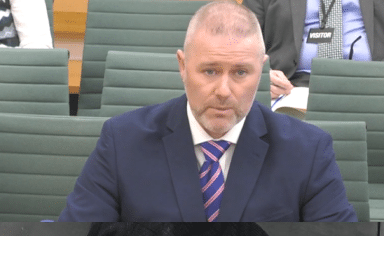
National Federation chair Steve Hartshorn addresses MPs at the Home Affairs Select Committee.
Cambridgeshire Police Federation has warned over-stretched officers will struggle to cope with the additional demands if told to cover for striking public sector workers.
Branch chair Liz Groom said workload was already high and that officers should not be expected to step in when other emergency service personnel walk out.
Liz was speaking as about 15,000 paramedics, medical technicians and call handling staff staged another strike across England and Wales on Monday (23 January).
She said: “Police officers are not allowed to go on strike however badly they feel they are being treated but are often called into action when others take industrial action so there is a certain irony there.
“But more importantly, a police officer sitting with a vulnerable patient in a hospital is a very poor use of limited resources and has an inevitable knock-on effect throughout the whole organisation with a backlog of work building up and priorities needing to be re-assessed.
“Police officers are overstretched as it is and it is not fair to expect them to take on even more work to cover for workers striking over their own pay and conditions.”
National chair Steve Hartshorn has told MPs that Police Federation members found it “galling” when told to fill the gaps during public sector strikes.
He told the Commons Home Affairs Select Committee: “I have received anecdotal accounts from our branch chairs and secretaries about members being asked to ferry victims to hospitals.
“That takes away from their core function of being a police officer – to protect and detect crime.
“When they get to the hospital they are sat around for a long time, like the ambulances, and can be there in pairs for hours.”
Steve said police officers were also called upon to ensure public safety during industrial action.
He said: “If railway workers go on strike and you suddenly have large numbers of people at the train stations, that’s an extra burden on police officers to deal with their safety.
“It is right to do that but again it takes away from our core function of responding to 999 calls and trying to be proactive in how we can deter crime from taking place in those very areas.
“It is disheartening for our members because, of course, they do not have the right to strike as Crown servants.”
